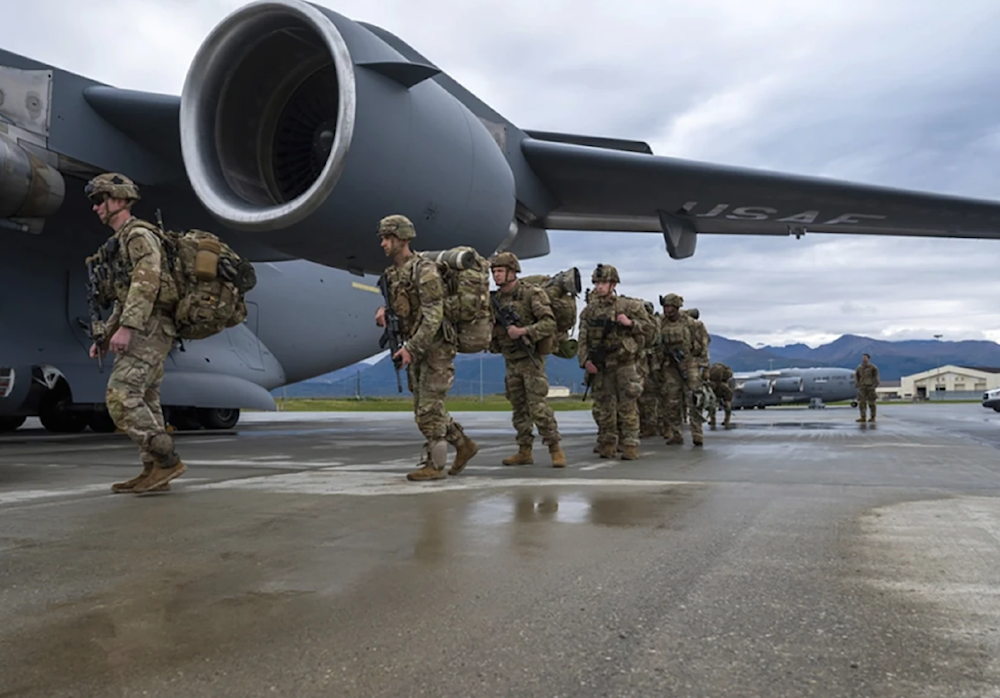US could lose possible war with Russia, China, Iran
Jane Harman, the NDSC Chair stated that the entire system, particularly the Defense Department, is risk-averse and hesitant to move.
-

US Army Soldiers at Joint Base Elmendorf-Richardson, Alaska, on September 13, 2024 (AP)
The United States may soon confront the threat of a major war with Russia, China, Iran, and North Korea soon, but it is completely unprepared for such a fight, according to a new study from the National Defense Strategy Commission (NDSC) delivered to Congress on Wednesday.
NDSC Chair Jane Harman stated in testimony before the US House Armed Services Committee that the main message was "Significant and urgent action is needed, but for years our government has failed to keep up."
Harman emphasized that risks to US national security have been increasing for two decades and are now larger than ever since the height of the Cold War if not World War II.
However, she stated that the entire system, particularly the Defense Department, is risk-averse and hesitant to move.
NDSC's Harman emphasized that the alliance of China, Russia, Iran, and North Korea represents a significant shift in the geopolitical environment, and the United States might find itself embroiled in a worldwide battle on the magnitude of World War Two.
"There is potential for near-term war and potential that we might lose such a conflict," according to Harmon.
The NDSC decided that the Biden administration's national security plan is already "woefully out of date" in light of the ongoing war in Ukraine, the war on Gaza, and other events, Harman stated.
Earlier, US Deputy Secretary of State Kurt Campbell said that the US is pressing for more European support as Russia establishes partnerships with nations such as China.
Despite $1tn annual budget, US military lagging behind
Vice President Kamala Harris' recent call for maintaining the world's most “lethal” military is a sentiment underscored by current global tensions, according to Hal Brands, a Bloomberg columnist.
This comes as Russia continues to gain ground in Ukraine, China is rapidly expanding its military and stockpiling resources, the DPRK is advancing its nuclear and missile capabilities, and Iran is only increasing its influence and deterrence in the Middle East.
Despite what Brands called "threats", he noted that the US faces significant challenges in modernizing its military.
The Pentagon’s effort to update its nuclear arsenal is plagued by delays and budget overruns. The modernization of bombers, land-based missiles, and submarines is lagging, and critical infrastructure is falling behind.
The US risks weakening its deterrent capability "at a time when it may need more nuclear weapons to maintain deterrence in a world in which both Russia’s and China’s forces rival its own."
Similarly, the US Navy is experiencing strain as it is decommissioning 17 logistical-support ships and is already stretched thin globally. The Navy requires more nuclear-powered attack submarines to counter China’s expansion but struggles with maintenance issues and a deteriorating shipbuilding industry.
According to Brands, the US faces worsening defense challenges as many of its Ronald Reagan-era ships, submarines, and planes approach or exceed their retirement age, with replacements not expected until the 2030s.
The military’s new strategies for high-intensity conflicts, like the Air Force's Agile Combat Employment and the Army’s Multi-Domain Operations, are still in development, leading to a firepower gap in the late 2020s when China aims to be prepared for potential action against Taiwan.

 3 Min Read
3 Min Read








